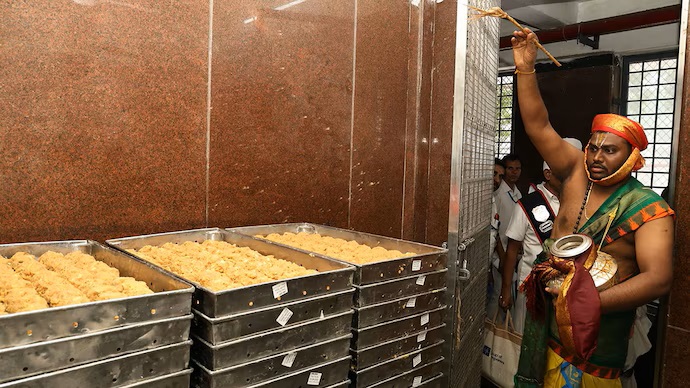
Andhra Pradesh CM Chandrababu Naidu, who made the prasadam scandal public, faces a major challenge of revamping temple administrations in the state.
-
Supreme Court probes Tirumala laddoo ghee scandal.
-
Fake labels and GST invoices found in ghee supply.
-
TTD under pressure to review procurement policies.
The Supreme Court-directed ongoing probe into the Tirumala laddoo scandal is turning murkier following the discovery of how ghee provided by Bhole Baba Organic Pvt Ltd, a Roorkee (Uttarakhand)-based company, was rebranded and supplied with fake stickers and counterfeit GST (Goods and Services Tax) invoices.
The probe by a joint SIT (Special Investigation Team), comprising two officers of the Central Bureau of Investigation (CBI), two from the Andhra Pradesh police and a representative of the Food Safety and Standards Authority of India (FSSAI), as ordered by the apex court in October 2024, has now laid bare the disregard for the quality of ghee supplied to make the iconic laddoo prasad at the shrine.
The probe so far details an elaborate scam involving forged documents and deliberate tampering of business records to evade scrutiny. The 14-page remand report, following the arrest of four accused on February 9, reveals that AR Dairy in Dindigul, Tamil Nadu, the prime accused, supplied substandard and adulterated ghee to the Tirumala Tirupati Devasthanams (TTD) through an elaborate network “with the intent of making wrongful gains, deceiving the TTD Trust Board, and hurting the religious sentiments of crores of devotees”.
Those arrested are Raju Rajasekharan, managing director of AR Dairy Pvt Ltd; Pomil Jain and Vipin Jain, directors of both Vyshnavi Dairy Specialities Pvt Ltd and Bhole Baba Organic Dairy Pvt Ltd; and Apurva Vinaykanth Chavda, CEO of Sri Vyshnavi Dairy Specialities near Srikalahasti, Andhra Pradesh.
The ghee supplied by AR Dairy was manufactured by Bhole Baba Dairy. It arrived at Vyshnavi Dairy in Punabaka, Tirupati, via Hanuman Transport and SKD Logistics, where it was rebranded with AR Dairy stickers and accompanied by counterfeit GST invoices, laboratory reports and warranty certificates.
The issue came to light in July last year when TTD officials had rejected four tankers of ghee from AR Dairy after it failed quality tests. Laboratory tests confirmed impurities in the ghee supplied by AR Dairy, which had won the tender at Rs 320 per kg. While TTD officials maintained that the impure ghee was neither accepted nor used in preparation of laddoo, the outcry led to the Supreme Court’s intervention and formation of the SIT after Andhra Pradesh chief minister Chandrababu Naidu claimed “animal fat” was used in making the Tirupati laddoo.
Laboratory analysis by the National Dairy Development Board (NDDB) on July 16 and 23 last year confirmed the presence of vegetable fats and other adulterants in the ghee, pointing to the possibility of tallow and lard but without any conclusive evidence.
The proxy supply plan was drawn up in 2018 when the Jains of Bhole Baba Dairy approached Vyshanvi Dairy with a proposal to participate in TTD’s ghee tenders under Vyshnavi’s name. The arrangement promised that Bhole Baba Dairy would supply all ghee and bear all expenses while Vyshnavi Dairy would receive a 2-3 per cent commission. Vyshnavi Dairy accepted the proposal, participated in tenders and started to supply ghee to TTD from 2020. However, in June 2022, some of its tankers failed TTD’s in-house lab tests and were rejected.
Bhole Baba Dairy has supplied ghee to the TTD for Rs 291 per kg since 2019. In 2022, an inspection found that their manufacturing processes were unsatisfactory, which led to the company being barred from future tenders. Instead of leaving the market, the dairy allegedly used proxies to return. Vyshnavi Dairy won a tender in 2020, and AR Dairy obtained another contract in March 2024 allegedly using forged documents. The SIT’s report shows that Bhole Baba Dairy helped its proxies secure these deals by allegedly faking food safety certifications to meet the tender requirements.
In October 2023, when TTD floated e-tenders, Bhole Baba Dairy transferred Rs 32 lakh and Rs 38 lakh to AR Dairy to participate in the 1,500 km radius category and the national category bids, respectively. TTD, which requires 15,000 kg of cow ghee daily for its laddoo prasadam, operates a three-tier procurement system through tenders: 2 million kg from national dairies, 1 million kg from dairies within a 1,500 km radius, and 500,000 kg from Andhra Pradesh dairies. The temple authority specifically mandates Agmark Special Grade cow ghee, supplied in 15 kg tins.
In January 2024, the Jains bought shares in Vyshnavi Dairy and secured directorship positions. Apurva Chavda continued as CEO while Sabbil Kalimulla Khan remained plant executive officer, both managing operations on behalf of the Jains. The nexus between the three dairies is still being unravelled as it has been found that several rejected consignments of ghee, instead of being returned to AR Dairy’s facility in Coimbatore, Tamil Nadu, were directed to Vyshnavi Dairy.
Further, the Jains reportedly attempted to mislead investigators by resigning as directors and appointing their vehicle drivers as replacements. “On September 1, 2024, both the directors of Vyshnavi Dairy Specialities Ltd—Pomil Jain and Vipin Jain—resigned from their posts and appointed Surendra Singh and Saurabh Kashyap in their place, who were drivers of their vehicles,” the probe report stated. The homes of the Jains in Dehradun were searched and vital documents seized.
Since the laddoo scandal broke last year, the TTD is under growing pressure to review purchase policies even as the SIT is trying to find out how conniving officials may have helped the banned supplier continue working through others. They suspect insider involvement in the scam. Chandrababu Naidu, who put the laddoo issue in the public domain by referring to it during a meeting of legislators of his Telugu Desam Party, may now face a major temple administration and management challenge.
You can now read the most important #news on #eDairyNews #Whatsapp channels!!!
🇮🇳 eDairy News ÍNDIA: https://whatsapp.com/channel/0029VaPidCcGpLHImBQk6x1F

















